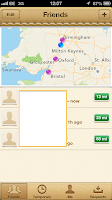Which iOS maps app?
Like pretty much everyone else I moaned and complained when iOS 6 removed the Google Maps I'd grown to rely on and produced a much inferior alternative. Since then I've grown to appreciate the (normally accurate) turn by turn navigation, something Google hadn't offered. And I've begun to notice slight improvements in the mapping accuracy. So far though I've found no use for the satellite flyover and near 3D view, apart from the initial flurry of interest. Now there's a Google Maps app for iOS again and I installed it almost as soon as I could. They've introduced turn by turn navigation to match Apple. And it is so nice to have the public transport info back, along with traffic. But I can't find Street View. And the Apple Map is obviously what I will get when I tap on an address in, say, a contact's record. So it's swings and roundabouts still. Both will occupy a corner of my screen space and I will use whichever is best in the location I find mys...
